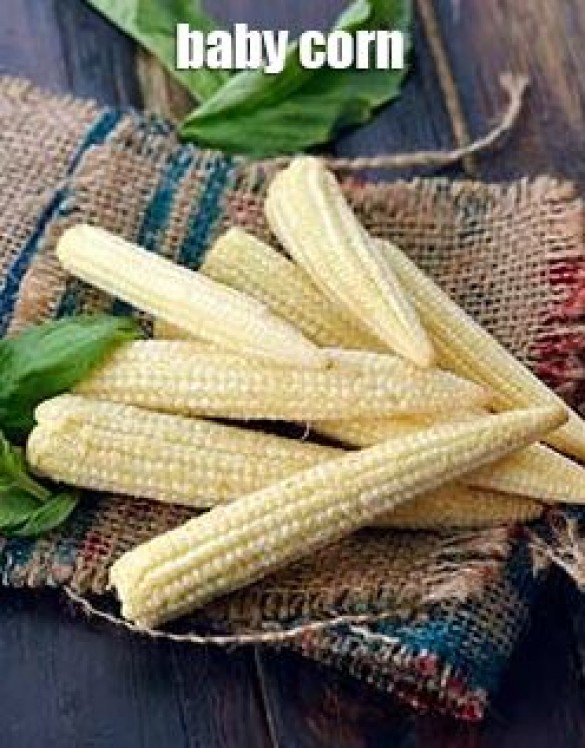
Baby corn, often admired for its petite size and tender texture, is not only a delightful addition to various dishes but also a nutritional powerhouse. Harvested at an early growth stage, baby corn boasts a range of health benefits that contribute to overall well-being. Baby corn is a popular food item that is also one of the most imported vegetables in the world. They are delicious and used in many cuisines but one has to know everything about it before consumption. Along with boosting health and satisfying our taste buds, there is a lot you should know about baby corn. Baby corn is a major ingredient used in so many fast food items. In this comprehensive article, we will delve into seven impressive health benefits of baby corn, highlighting its nutrient content, culinary versatility, and potential impact on various aspects of health.
Nutrient-Rich Profile:
Baby corn is a miniature powerhouse of essential nutrients, packing a surprising punch despite its diminutive size. It is a good source of vital vitamins and minerals that play crucial roles in supporting various bodily functions. For instance, baby corn contains significant amounts of vitamin C, an antioxidant that supports the immune system and promotes skin health. Additionally, its vitamin A content contributes to healthy vision, while potassium helps regulate blood pressure and fluid balance within the body. Folate, another key nutrient found in baby corn, is essential for cell division and supports the development of healthy cells.
Low-Calorie, High-Nutrient Food:
In an era where many individuals are conscious of their calorie intake, baby corn shines as a low-calorie food option. Its naturally low-calorie content makes it a suitable choice for those aiming to manage their weight while still enjoying delicious meals. Despite being low in calories, baby corn is rich in nutrients, allowing individuals to meet their nutritional needs without excessive calorie consumption. Baby corn is a low-calorie food, so you can include it in your meals without a second thought. However, don't get too excited to eat it for the low-calorie content, and take care of the quantity at all times. Moreover, it is less starchy than sweet corn and has minimal fat content, which makes it an aid for weight loss as well.
Dietary Fiber for Digestive Health:
A diet rich in dietary fiber is essential for maintaining a healthy digestive system. Baby corn contains dietary fiber, which promotes regular bowel movements and helps prevent constipation. The fiber content in baby corn contributes to a healthy gut environment, supporting the growth of beneficial gut bacteria and aiding in digestion. Incorporating baby corn into your meals can help ensure a well-functioning digestive system. As baby corn has high fiber content, this nutrient helps in enhancing the process of digestion. Things can be the opposite if you overconsume this vegetable, but if taken in moderation, baby corn can help with digestion.
Antioxidant Properties and Cellular Protection:
Baby corn contains a variety of antioxidants that play a crucial role in protecting cells from oxidative stress. Oxidative stress occurs when there is an imbalance between harmful free radicals and the body's ability to neutralize them. Antioxidants, such as those found in baby corn, help counteract this imbalance, reducing the risk of cellular damage. By including baby corn in your diet, you can contribute to your body's defense against chronic diseases and promote overall health.
Versatility in Culinary Applications:
One of the remarkable features of baby corn is its culinary versatility. With its mild and slightly sweet flavor profile, baby corn complements an array of dishes and cuisines. Whether used in stir-fries, salads, soups, or appetizers, baby corn adds a unique texture and flavor that elevates the sensory experience of eating. Its visually appealing appearance also enhances the aesthetic appeal of dishes, making them more inviting and enjoyable.
Texture and Crunch for Enhanced Dining:
The texture of food plays a significant role in our dining experience, and baby corn delivers a delightful crunch that enhances various recipes. Its crispiness adds an element of satisfaction to dishes, creating a pleasing contrast to softer ingredients. Whether you're preparing a crunchy salad or a stir-fry, the addition of baby corn can elevate the overall texture and mouthfeel of your culinary creations.
Diabetic-Friendly Option:
For individuals managing diabetes, monitoring carbohydrate intake is crucial for maintaining stable blood sugar levels. Baby corn offers a favorable option, as it has a lower glycemic index compared to mature corn. The glycemic index measures how quickly carbohydrates in a food raise blood sugar levels. Baby corn's lower glycemic index means it has a milder impact on blood sugar, making it a suitable choice for individuals with diabetes who want to enjoy a variety of flavorful dishes while managing their condition.
In conclusion, the humble baby corn boasts an impressive array of health benefits that make it a valuable addition to a well-rounded diet. From its nutrient-rich profile and low-calorie content to its role in supporting digestive health and cellular protection, baby corn has earned its place as a versatile and nutritious ingredient. Its culinary adaptability, delightful crunch, and potential benefits for individuals with diabetes further contribute to its appeal. By incorporating baby corn into your meals, you can savor its distinct flavor and texture while reaping the numerous health rewards it has to offer.
7 Superfoods to Strengthen Your Immune System and Fight Tonsillitis
7 of India's Most Popular Street Foods, from Samosa to Pani Puri
30 Must-Try Recipes for Slow Cooker